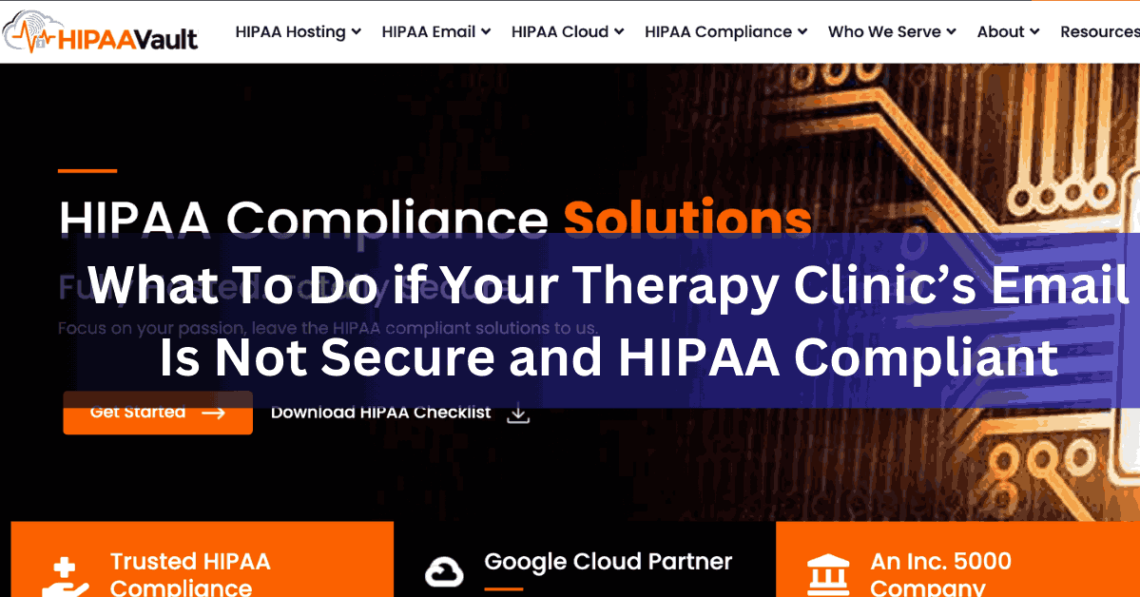
What To Do if Your Therapy Clinic’s Email Is Not Secure and HIPAA Compliant
Therapists have an ethical and legal obligation to protect their patients’ private health information. HIPAA regulations establish protocols for securely transmitting protected health information (PHI).
Using HIPAA compliant email for therapists can help prevent data breaches, which may undermine patient confidentiality. Therapists can use specialized email platforms to take action against unauthorized access to sensitive patient communications.
Understanding HIPAA Compliant Email for Therapists
The HIPAA Security Rule mandates that healthcare providers transmit PHI through a secure medium. Standard email lacks the proper safeguards to prevent interception or access by unauthorized parties.
HIPAA compliant email for therapists provides encrypted messaging to keep communications private. These platforms also allow sender authentication, access controls, and audit capabilities. Clinics using regular email put themselves at risk of privacy violations.
Conducting a Risk Assessment
Upon discovering a non-compliant email provider, clinic owners should conduct a risk assessment immediately. Review current email practices to identify vulnerabilities in PHI protections. Determine whether any prior data breaches have occurred. Consult IT specialists to detect security gaps in the email system. Document all findings to understand the clinic’s level of non-compliance.
Notifying Patients of the Issue
Clinics should inform patients if a breach has allowed unauthorized access to their PHI. While this is not required for potential violations, transparency regarding email security issues can help maintain patient trust.
Send notifications explaining the problem and reassure patients that your facility is taking steps to fix the issue. Provide patients with information about protecting themselves and their information from potential impacts of the breach.
Enabling Email Encryption
Clinics can enable email encryption to make current email systems HIPAA compliant. Encrypted email converts messages into coded form, preventing unauthorized access. Verify that any encryption method meets HIPAA’s addressable standard before implementation. Encryption may slow email performance, so assess its impact before broad activation.
Using a HIPAA Compliant Provider
Switching to a HIPAA compliant email provider can help secure communications. These providers regularly verify that their security protocols satisfy HIPAA email standards. Transfer your patient email history to the new provider to maintain appropriate continuity of care. Update email contacts and provide instructions to patients for communicating with the new address.
Establishing Access Controls
Strict access controls can limit PHI exposure when using non-compliant email. Restrict employee access through role-based permissions aligned with job duties.
Impose authentication requirements like secure passwords or multi-factor login. Install security software like firewalls and anti-malware to prevent unauthorized system access. Conduct ongoing audits to identify inappropriate email account access.
Securing PHI in Attachments
Exercise caution when sending PHI attachments through non-compliant email. Remove embedded patient identifiers from file names and metadata before sending.
Encrypt attachments containing PHI for added security. Verify recipient identity before transmitting to prevent improper disclosure. Consider more secure transfer options for sensitive PHI attachments.
Seeking Legal Guidance
Clinic leaders may need to seek qualified legal counsel regarding the ramifications of non-compliant emails. Legal professionals can help you determine potential liability and options to mitigate data-breach risks.
Request an advisory opinion on whether the clinic’s circumstances violate HIPAA regulations. Seek guidance on managing any data breaches that have occurred, and follow all legal advice to become HIPAA compliant.
Start Using HIPAA Compliant Email
Using non-compliant email puts therapists at risk of breaching patient confidentiality. If your facility uses a standard email platform, immediately assess vulnerabilities and strengthen protections around PHI in email communications.
Implement stop-gap measures until you can transition to HIPAA compliant email platforms for therapists. Maintaining email security protects the therapist-patient relationship, as patients have a right to expect their most sensitive information to remain private and secure. Contact a HIPAA compliant email provider today to learn more about protecting your clients’ sensitive information.
You May Also Like

Marriage Of Convenience: Novel Updates And Exciting Spoilers
July 14, 2023
lakers starting lineup – Everything you Need To know About It
June 22, 2023

